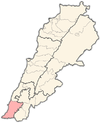Derdghaya
Derdghaya
دردغيا | |
|---|---|
Municipality | |
| Coordinates: 33°16′50″N 35°22′35″E / 33.28056°N 35.37639°E | |
| Country | |
| Governorate | South Governorate |
| District | Tyre |
| Time zone | GMT +3 |
Derdghaya (Arabic: دردغيا) is a municipality in Tyre District, Governorate of South Lebanon.
History
[edit]
The Survey of Western Palestine (SWP) noted here: "a stone, forming the lintel of the modern church of the village ; it is ancient, having been brought from Deir Abu Dei."[2] A Greek inscription was found in this village in the year 1860. It was over the door of the church of St. George.[1][3]
Ottoman era
[edit]In 1875, Victor Guérin noted "I arrive at Derdarhieh, a village built on the slopes and on the top of a hill. It has 600 inhabitants, all Greeks united. A number of houses are newly built. Above the door of a small church has been depicted an arched niche, between two crosses, and on the same stone is a line of Greek characters, now very faded, which M. Renan, according to a copy given to him in 1860 by M. Durighello, vice-consul of Saida, believes he can restore.[....] In the same village I was shown a large sepulchral basin in terracotta, recently unearthed and at one of the corners of which on the outer rim there are two small signs which appear, on the outer rim, two small signs which seem to be emblems of the goddess Astarte.[4]
In 1881, the PEF's Survey of Western Palestine (SWP) described the village (which they called Deir Dughiah; meaning "the convent of Dughiya"[5] ) as: "A village built of stone, containing about 300 Christians; contains a modern Christian church [...] ; situated on a hill, surrounded by fig-trees and arable land; water supplied by rock-cut cisterns."[6]
Modern era
[edit]On 9 October 2024, the Israel Defense Forces (IDF) conducted an airstrike on a Melkite church in the village of Derdghaya, in Southern Lebanon, as part of the 2024 Israeli invasion of Lebanon.[7] The airstrike killed at least eight people inside the church. The IDF also hit the house of a priest and the parish offices.[8]
Demographics
[edit]In 2014, Christians made up 95.38% of registered voters in Derdghaya. 75.27% of the voters were Greek Catholics and 16.26% were Maronite Catholics.[9]
References
[edit]- ^ a b Conder and Kitchener, 1881, SWP I, p. 115
- ^ Conder and Kitchener, 1881, SWP I, pp. 114-115
- ^ Renan, 1864 p. 645
- ^ Guérin, 1880, p.257: "j'arrive à Derdarhieh, village bati sur les pentes et sur le sommet d'une colline. Il compte 6oo habitants, tous Grecs unis. Un certain nombre de maisons sont nouvellement construites. Au-dessus de la porte d'une petite église a été figurée une niche cintrée, entre deux croix, et sur la même pierre est une ligne de caractères grecs, aujourd'hui très effacés, que M. Renan, d'après une copie que lui avait remise, en 1860, M. Durighello, vice-consul de Saïda, croit pouvoir restituer amsi:[.......] Dans le même village on me montre une grande cuve sépulcrale en terre cuite, récemment déterrée et à l'un des angles de laquelle on remarque, sur le rebord extérieur, deux petits signes qui paraisue, sur le rebord extérieur, deux petits signes qui paraissent être des emblèmes de la déesse Astarté."
- ^ Palmer, 1881, p. 20
- ^ Conder and Kitchener, 1881, SWP I, p. 91
- ^ Balog, Amy (10 October 2024). "LEBANON: At least eight killed in airstrike on church". acnuk.org. Aid to the Church in Need.
- ^ Henríquez, Andrés (11 October 2024). "Israeli missile destroys Catholic church in Lebanon; at least 8 dead". catholicnewsagency.com. CNA.
- ^ "التوزيع حسب المذاهب للناخبين/ناخبات في بلدة دردغيا، قضاء صور محافظة الجنوب في لبنان". إعْرَفْ لبنان.
Bibliography
[edit]- Conder, C.R.; Kitchener, H.H. (1881). The Survey of Western Palestine: Memoirs of the Topography, Orography, Hydrography, and Archaeology. Vol. 1. London: Committee of the Palestine Exploration Fund.
- Guérin, V. (1880). Description Géographique Historique et Archéologique de la Palestine (in French). Vol. 3: Galilee, pt. 2. Paris: L'Imprimerie Nationale.
- Palmer, E.H. (1881). The Survey of Western Palestine: Arabic and English Name Lists Collected During the Survey by Lieutenants Conder and Kitchener, R. E. Transliterated and Explained by E.H. Palmer. Committee of the Palestine Exploration Fund.
- Renan, E. (1864). Mission de Phénicie (1865–1874). Paris.
{{cite book}}: CS1 maint: location missing publisher (link)
External links
[edit]- Derdghaya (archive.org), localiban
- Survey of Western Palestine, Map 2: IAA, Wikimedia commons


